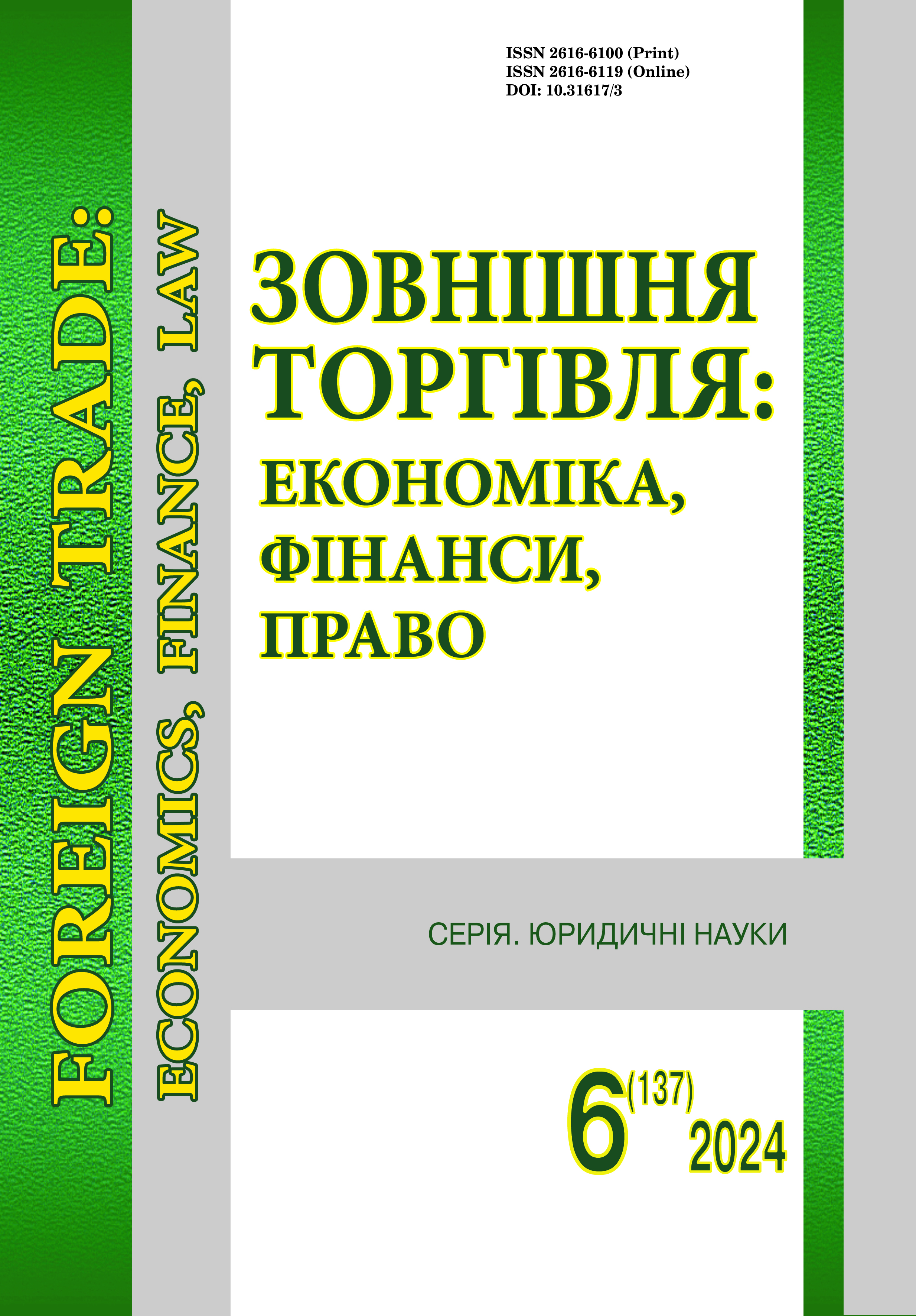Regulation of online platforms in Chinese law
DOI:
https://doi.org/10.31617/3.2024(137)08Keywords:
: online platforms, self-regulation of economic activity, competition law, cybersecurity, China.Abstract
Regulation of online platforms has become an obvious trend in the last decade, which is associated with the significant impact of their functioning on millions of users. At the same time, approaches to such regulation are different and distinguish three main approaches – American, European and Chinese. The approach to regulating online platforms in the Peopleʼs Republic of China (PRC) is analysed. The uniqueness of the Chinese approach is due to: on the one hand, the involvement of authoritarian methods of management and regulation to control the population, and on the other hand, the successful promotion of innovation and technological progress development in this area, which allowed the creation in the PRC of one of the largest digital markets in the world in almost 30 years, where online platforms play a key role in social, economic and political processes. The hypothesis of the study posits that the regulation of online platforms in the PRC relies on an authoritarian management model, enabling swift response to challenges while providing support for domestic policy, as well as successfully supports the development of innovations in the digital sphere. The analysis of scientific sources provided an understanding of the regulation of online platforms from the point of view of public and private interest balance, as well as clarification of the peculiarities of Chinese state policy. In turn, the highlighting of the peculiarities of the Chinese approach was achieved through a consistent teleological interpretation of Chinese regulatory acts, the subject of which is the regulation of access to the Internet and its use, and directly online platforms. The study identifies key features of the Chinaʼs approach to regulation: the implementation of political censorship, user de-anonymization, the creation of institutional platform oversight, and limiting the influence of foreign IT companies. The main results are the identification of the the dual nature of regulation: on the one hand, it is aimed at protecting users from platform abuses, and on the other hand, it ensures state control over information flows. Thus, the Chinese model of online platform regulation demonstrates a unique approach combining technocratic control with political objectives.
References
Bradford, A. (2023). Digital empires: The Global Battle to Regulate Technology. Oxford University Press. https://doi.org/10.1093/oso/9780197649268.001.0001 DOI: https://doi.org/10.1093/oso/9780197649268.001.0001
Bradford, A. (2024). The false choice between digital regulation and innovation. Northwestern University Law Review, 118(2), 377-454. https://doi.org/10.2139/ssrn.4753107 DOI: https://doi.org/10.2139/ssrn.4753107
China Briefing. (2021). The PRC Personal Information Protection Law (Final): A full translation. https://www.china-briefing.com/news/the-prc-personal-information-protection-law-final-a-full-translation/
China Law Translate. (2016). Provisions on Management of Internet News Services. https://www.chinalawtranslate.com/en/provisions-on-internet-news-information-management/
China Law Translate. (2019). Provisions on the governance of the online information content ecosystem. https://www.chinalawtranslate.com/en/provisions-on-the-governance-of-the-online-information-content-ecosystem/
Chinaʼs State Administration for Market Regulation releases interim provisions on Anti-Unfair competition on the internet. (2024, May 13). https://www.chinaiplawupdate.com/2024/05/chinas-state-administration-for-market-regulation-releases-interim-provisions-on-anti-unfair-competition-on-the-internet/
Companies Market Cap. (2024). Top publicly traded internet companies by revenue. https://companiesmarketcap.com/internet/largest-internet-companies-by-revenue/
Creemers, R. (2017). Cyber China: Upgrading propaganda, public opinion work and social management for the twenty-first century. Journal of Contemporary China, 26(103), 85-100. https://doi.org/10.1080/10670564.2016.1206281 DOI: https://doi.org/10.1080/10670564.2016.1206281
DigiChina. (2017). Translation: Cybersecurity law of the Peopleʼs Republic of China. https://digichina.stanford.edu/work/translation-cybersecurity-law-of-the-peoples-republic-of-china-effective-june-1-2017/
DigiChina. (2021). Translation: Data security law of the Peopleʼs Republic of China. https://digichina.stanford.edu/work/translation-data-security-law-of-the-peoples-republic-of-china/
Fontaine, R., & Rogers, W. (2011, October). Chinaʼs Arab Spring cyber lessons. The Diplomat. https://thediplomat.com/2011/10/chinas-arab-spring-cyber-lessons/
Gao, C. (2017, September). China fines its top 3 internet giants for violating cybersecurity law. The Diplomat. https://thediplomat.com/2017/09/china-fines-its-top-3-internet-giants-for-violating-cybersecurity-law/
Gorwa, R. (2024). The politics of platform regulation: How governments shape online content moderation. Oxford Studies in Digital Politics. Oxford Academic. https://doi.org/10.1093/oso/9780197692851.001.0001 DOI: https://doi.org/10.1093/oso/9780197692851.001.0001
Hamza, A. (2024). 10 U.S. Websites Banned in China and Other Countries. Listverse. https://listverse.com/2024/11/26/10-u-s-websites-banned-in-china-and-other-countries/
Library of Congress. (2018, November 21). China: E-commerce law passed. Global Legal Monitor. https://www.loc.gov/item/global-legal-monitor/2018-11-21/china-e-commerce-law-passed/
Ministry of Commerce of the Peopleʼs Republic of China. (2019). E-commerce law of the Peopleʼs Republic of China. http://mg.mofcom.gov.cn/article/policy/201912/20191202923971.shtml
Reuters. (2017). China closes 60 celebrity gossip social media accounts. https://www.reuters.com/article/us-china-internet-censorship-idUSKBN18Z0J3/
Sanger, D. E. (2000, March 9). Clinton sends to a wary Congress a long-delayed China trade bill. The New York Times. https://www.nytimes.com/2000/03/09/world/clinton-sends-to-a-wary-congress-a-long-delayed-china-trade-bill.html
Sapir, A., & Mavroidis, P. C. (2021, April 29). China and the WTO: An uneasy relationship. https://cepr.org/voxeu/columns/china-and-wto-uneasy-relationship https://doi.org/10.1515/9780691206608 DOI: https://doi.org/10.1515/9780691206608
Strittmatter, K. (2013, July 3). Why Chinaʼs internet censors canʼt get enough of Edward Snowden. https://worldcrunch.com/world-affairs/why-china039s-internet-censors-can039t-get-enough-of-edward-snowden
Wang, J. (2020). Regulation of digital media platforms: The case of China. Oxford: The Foundation for Law, Justice and Society.
Wang, J. (2022). Platform responsibility with Chinese characteristics. Defeating Disinformation. https://digitalplanet.tufts.edu/wp-content/uploads/2023/02/DD-Report_1-Jufang-Wang-11.30.22.pdf
Weber Digital. (2023). What is an ICP license? Types & requirements. https://service.weber.digital/index.php?/en/Knowledgebase/Article/View/what-is-an-icp-license-types--requirements
Webster, G. (2019). A brief history of the Chinese Internet. https://logicmag.io/china/a-brief-history-of-the-chinese-internet/
Yang, S. (2021, June 6). Chinaʼs tech clampdown is spreading like wildfire. The Wall Street Journal. https://www.wsj.com/articles/chinas-tech-clampdown-is-spreading-like-wildfire-11622971802
Zhang, A. H. (2022). Agility over stability: Chinaʼs great reversal in regulating the platform economy. In Harvard International Law Journal, 63(2). https://journals.law.harvard.edu/ilj/wp-content/uploads/sites/84/HLI203_crop-3.pdf
Zhang, A. H. (2024). High wire: How China Regulates Big Tech and Governs Its Economy. Oxford University Press. https://doi.org/10.1093/oso/9780197682258.001.0001 https://doi.org/10.1080/17544750.2024.2404287 DOI: https://doi.org/10.1093/oso/9780197682258.001.0001
Zheng, H. (2013). Regulating the Internet: Chinaʼs Law and Practice. Beijing Law review, 4(1), 37-41. https://doi.org/10.4236/blr.2013.41005 DOI: https://doi.org/10.4236/blr.2013.41005
Additional Files
Published
How to Cite
Issue
Section
License

This work is licensed under a Creative Commons Attribution 4.0 International License.
This work is licensed under a Creative Commons Attribution 4.0 International (CC BY 4.0)







